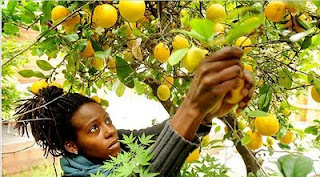 There's a great article up over at the New York Times Dining & Wine section regarding urban fruit foraging cooperatives. The woman in the picture above, Asiya Wadud, is the founder of the neighborhood fruit exchange Forage Oakland. In college she majored in Urban Sociology and she worked at Alice Waters' Berkeley restaurant Chez Panisse--one of the most foundational enterprises for the locavore movement.
There's a great article up over at the New York Times Dining & Wine section regarding urban fruit foraging cooperatives. The woman in the picture above, Asiya Wadud, is the founder of the neighborhood fruit exchange Forage Oakland. In college she majored in Urban Sociology and she worked at Alice Waters' Berkeley restaurant Chez Panisse--one of the most foundational enterprises for the locavore movement.Ms. Wadud works to connect people with over-abundant Bay-Area Fruit trees and people willing to harvest them (and sometimes do pruning work). Generally, the harvest is split between the owners, the pickers, and local food banks.
"Supporters of this movement hold two basic principles. One, it’s a shame to let fruit go to waste. And two, neighborhood fruit tastes best when it’s free."
Its not just in the Bay Area that this movement has seen growth, Brooklyn, LA, Pennsylvania, and more have seen local coops develop around this idea of shared bounty.
All over the country, the underground fruit economy is growing. At new Web sites like neighborhoodfruit.com and veggietrader.com, fruit seekers can find public mulberry patches in Pennsylvania and neighbors willing to trade blackberries in Oklahoma.
In Royal Oak, Mich., a woman investigated how to start a fruit exchange modeled after Fallen Fruit (fallenfruit.org), an arts group that designs maps of accessible fruit growing in Los Angeles neighborhoods.
In Alaska, cooks used Facebook to find willing donors of backyard rhubarb, the first dessert crop that grows after the long winter. In Columbia, S.C., university students pulled spare peaches from orchards and donated them to a local food bank.Its not been seemless, with some misunderstanding of foraging law, for example it is perfectly legal in California to pick fruit from a neighbor's tree over the fence but some fruit tree owners are unaware of that and in some cases foragers have crossed onto property without permission, misunderstanding the law or assuming a fruit tree listed on one of the maps indicates that the owner is open to anyone--its understandable that owners would want to screen foragers on their property, when and for how long, not at all. So, where the movement has some growing to do and some etiquette to establish, certainly.
I have a couple apple trees--they are in a bit of trouble right now and we're doing some serious pruning to repair from last winter's ice-storm and chilly spring which must have killed off the blossoms because only a couple apples appeared this year and quickly underdeveloped and fell to the ground. Last year, it was crazy harvest town and I ended up composting the majority on the ground (oops). So, something like this urban foraging movement, on a good year, I'd definitely be interested in pursuing. From what I understand, at least in Kentucky, is that good Samaritan Laws protect one from liability suits when it comes to urban picking, so that's good. Overall, I do agree that generally, fruit trees should be shared--you can only eat so many apples before you get completely tired of them and apple-butter is not an everyday staple. So why not share? In return, you often get a share of another neighbor's harvest of plums or peaches.
Check out the whole article!
No comments:
Post a Comment